|
|
|
Sort Order |
|
|
|
Items / Page
|
|
|
|
|
|
|
| Srl | Item |
| 1 |
ID:
163069
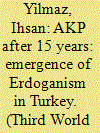

|
|
|
|
|
| Summary/Abstract |
In recent years, several observers of Turkey have recognised a novel development in Turkish politics: the rise of Erdoganism. President Recep Tayyip Erdoğan’s personality and style have come to embody the Turkish nation, the state and its economic, social and political institutions. But what is Erdoganism? What are its main attributes? Is it a mere ideology or the name of the emerging political regime in Turkey? While commentators have provided several observations of Erdoganism, it has not been duly examined on its own in the academic literature. This paper’s main premise is that in Turkey, a new political regime has emerged in recent years which can best be defined as Erdoganism. Erdoganism has four main dimensions: electoral authoritarianism as the electoral system, neopatrimonialism as the economic system, populism as the political strategy and Islamism as the political ideology. We first explain why we think Erdoganism is a better concept to define the emerging political regime in Turkey. We briefly discuss Sultanism, Khomeinism and Kemalism in order to produce a set of references for our discussion of Erdoganism. We then provide a thorough analysis, explaining the ways in which Erdoganism manifests itself through electoral authoritarianism, neopatrimonialism, populism and Islamism.
|
|
|
|
|
|
|
|
|
|
|
|
|
|
|
|
| 2 |
ID:
192067
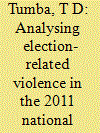

|
|
|
|
|
| Summary/Abstract |
This study seeks to explore the triggers, perpetrators and consequences of electoral violence in the 2011 national elections in the Democratic Republic of Congo (DRC). From the perspective of different domestic and international electoral observers, the 2011 elections in the DRC were marred by violence. A qualitative approach based on secondary resources was employed to achieve the purpose of the study. Following the content analysis of various documents related to electoral violence during the 2011 elections in the DRC, the findings of the study indicated that members of law enforcement and state agencies (police, the national intelligence agency, the Republican Guard and administrative authorities) including supporters of political parties were identified as the main perpetrators of election-related violence in the DRC. In addition, the paper showed that structural causes such as weak institutionalisation of democracy together with lack of national sense of cohesion were the potential triggers of the 2011 election-related violence in the DRC.
|
|
|
|
|
|
|
|
|
|
|
|
|
|
|
|
| 3 |
ID:
082211
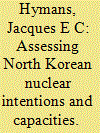

|
|
|
|
|
| Publication |
2008.
|
| Summary/Abstract |
This article develops a novel assessment of the nuclear program of the Democratic People's Republic of Korea. Using a theory-driven approach rooted in comparative foreign policy analysis, the article undermines two common assumptions about the DPRK nuclear threat: first, that the North Korean leadership's nuclear intentions are a measured response to the external environment and, second, that the DPRK has developed enough technical capacity to go nuclear whenever it pleases. In place of these assumptions, the article puts forth the general theoretical hypotheses that (1) the decision to go nuclear is rarely if ever based on typical cost-benefit analysis, and instead reflects deep-seated national identity conceptions, and (2) the capacity to go nuclear depends not only on raw levels of industrialization and nuclear technology, but also on the state's organizational acumen. Applied to the case of the DPRK, these hypotheses suggest that it has long been strongly committed to the goal of acquiring an operational nuclear deterrent, but also that it has been finding it very difficult to successfully implement that wish. The article also demonstrates that these hypotheses are supported by the meager evidence available on this case
|
|
|
|
|
|
|
|
|
|
|
|
|
|
|
|
| 4 |
ID:
178004


|
|
|
|
|
| Summary/Abstract |
The Big Man has attracted considerable attention from social scientists, both as an explanatory force as well as a phenomenon to be explained. But the concept has become unmoored from its original meaning. Once used to refer to an apex figure within a patrimonial regime, today Big Men are often described as dictators or thieves. I show this using an original dataset covering discussions of Big Men in leading African Studies journals since 1980. I find that authors, especially political scientists, overemphasise theft and underemphasise accountability of Big Men. Then, drawing on my research with Ghanaian local politicians, I show how Big Men are constantly under pressure from their supporters. The paper concludes with a modest call to put the Big Man back in his place as powerful but also empowered, and thus indebted, to those beneath him.
|
|
|
|
|
|
|
|
|
|
|
|
|
|
|
|
| 5 |
ID:
175525


|
|
|
|
|
| Summary/Abstract |
This article examines why the emancipation of ethnic groups has failed to address ethnic conflicts in Uganda. Successive Ugandan governments, especially the current regime of President Yoweri Museveni, have attempted to end the country’s history of ethnic strife by creating separate constituencies, separate districts and separate kingdoms for marginalised ethnic groups to free them from the domination of powerful ethnic groups. Focussing on the Rwenzori area of western Uganda where ethnic violence is severest, I show how the approach of ethnic emancipation reproduces ethnicity as the basis for political inclusion and escalates rather than abates ethnic contestations. This study should shed more light on the challenge of ethnic federalism in other countries like Ethiopia and Nigeria.
|
|
|
|
|
|
|
|
|
|
|
|
|
|
|
|
| 6 |
ID:
110787
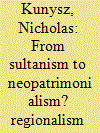

|
|
|
|
|
| Publication |
2012.
|
| Summary/Abstract |
This paper proposes that under President Berdimuhamedov, the government of Turkmenistan has begun to move away from the 'sultanism' of the Niyazov era. Instead, the new government exhibits characteristics and has pursued policy changes that prepare conditions for the further development and entrenchment of localized networks of elites based on kinship. Such changes suggest that the government of Turkmenistan may develop into a more classic neopatrimonial system of authoritarian governance similar to the other post-Soviet republics in Central Asia. This argument is advanced by examining changes between the governments of former President Niyazov and Berdimuhamedov with regard to three areas of the Turkmen state's relationship with its constituent regions: regional composition of the national cabinet; hakim (governor) policy; and regional development. This examination relies largely on a comprehensive survey of online Turkmen state-media sources, as well as numerous supportive secondary sources.
|
|
|
|
|
|
|
|
|
|
|
|
|
|
|
|
| 7 |
ID:
139806


|
|
|
|
|
| Summary/Abstract |
Although consociational-style ethnic power-sharing arrangements are frequently adopted in postconflict African states, their track record is spotty at best. Using post-civil war Nigeria (one of Africa's most durable experiments with ethnic proportionality in government), I argue that the failure of formal ethnic power-sharing in Africa is due to its intersection with the largely informal power-sharing practices characteristic of neopatrimonial political systems. In Nigeria, well-intentioned policies meant to ensure ethnic proportionality reinforce the power of patronage networks that also rely on ethnic and kinship mobilization to capture state resources. As a result, entrenched ethnic power sharing in Nigeria's federal constitution since the late 1970s has played a key role in the country's descent into corruption and poor governance.
|
|
|
|
|
|
|
|
|
|
|
|
|
|
|
|
| 8 |
ID:
106678


|
|
|
|
|
| Publication |
2011.
|
| Summary/Abstract |
Neopatrimonialism is a concept that has predominately been applied to describe governance in sub-Saharan Africa. Recently, however, it has also been used to describe governance in states from other world regions. However, scholars have rarely attempted systematically to compare neopatrimonial rule in different regional settings. This paper aims to narrow this gap by examining the effect of neopatrimonialism on the tax administration as a core state function in six countries from three different world regions: Argentina, Venezuela, Indonesia, the Philippines, Kenya and Zambia. We conclude that neopatrimonialism is a valuable concept for comparative area studies with the potential to foster dialogue on the 'state in operation' across the regional divide. Nevertheless, several indicators are more valid for some world regions than for others. We find that there is no systematic relationship between neopatrimonial trajectories and the strength of tax administration. Individual actor decisions influence the outcomes of neopatrimonialism substantially.
|
|
|
|
|
|
|
|
|
|
|
|
|
|
|
|
| 9 |
ID:
163222
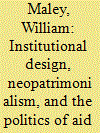

|
|
|
|
|
| Summary/Abstract |
State disruption confronted Afghanistan’s rulers and their international supporters with a challenging legacy after 2001. The emergence of a neopatrimonial political order, with formal bureaucratic and administrative structures entwined with informal networks and patronage, has significantly affected attempts at aid delivery. Such dangers need to be recognized and addressed at the outset in internationally supported transitions
|
|
|
|
|
|
|
|
|
|
|
|
|
|
|
|
| 10 |
ID:
105181


|
|
|
|
|
| Publication |
2011.
|
| Summary/Abstract |
Cambodia has undergone substantial changes since the United Nations' sponsored election in 1993. Politically, the country has become increasingly stable under the domination of the ruling Cambodian People's Party (CPP). Economically, Cambodia has achieved an unprecedented level of economic performance, with GDP growth averaging almost 10 percent annually during the five years preceding the current economic crisis. In spite of these improvements in political and economic conditions, land rights have emerged as a major issue affecting the lives of many poor Cambodians. Comprehensive overall analysis of land policy reforms in the country remains lacking, however, and this article fills a void in the existing literature. Our analysis shows that despite land policy reforms in the past decade, Cambodia's land rights problems continue unabated. What accounts for this development? Through analysis of government land policies, an array of primary documents, and interview data from government officials and investors, this article questions the relevance of Cambodia's land policy reforms. Its central premise is that although past collectivization and weak governmental institutions have contributed to land rights issues, it is neopatrimonialism-a mechanism that dictates political interaction among the elites and between the elites and the electorate and resources governance and distribution-that perpetuates land rights problems and limits land policy reform.
|
|
|
|
|
|
|
|
|
|
|
|
|
|
|
|
| 11 |
ID:
139924
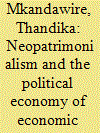

|
|
|
|
|
| Summary/Abstract |
During the past two decades, neopatrimonialism has become the convenient, all purpose, and ubiquitous moniker for African governance. The school of thought behind this research program, which the author refers to as the neopatrimonialism school, has produced an impressive literature on Africa. Its analysis informs policymakers and its language permeates media reportage on African states. While neopatrimonialism has long been a focus of development studies, in recent times it has assumed politically and economically exigent status. The school identifies causal links between neopatrimonialism and economic performance, and makes predictions drawing from what is referred to as the "logic of neopatrimonialism." Neopatrimonialism is said to account for trade policies, hyperinflation, economic stagnation, low investment in infrastructure, urban bias, andultimately, the lack of economic development in Africa. This article examines the empirical basis of predictions and policy prescriptions. It argues that while descriptive of the social practices of the states and individuals that occupy different positions within African societies, the concept of neopatrimonialism has little analytical content and no predictive value with respect to economic policy and performance.
|
|
|
|
|
|
|
|
|
|
|
|
|
|
|
|
| 12 |
ID:
134143
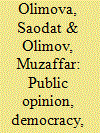

|
|
|
|
|
| Publication |
2014.
|
| Summary/Abstract |
Based on Tajikistan's experience, this article examines the evolution of views, values, and preferences of the population of the Central Asian (CA) countries that support the sustainability of their political regimes. Based on public opinion poll results, this article presents the population's preferences regarding the political system, sheds light on its attitude toward state power and its institutions, and gives assessments of the current regime and efficiency of different forms of citizen engagement. It also looks at the ways citizens participate in state governance and how effectively value judgments are being implemented.
The paper shows that despite the differences in the traditional social institutions of the CA states, as well as in the development paths they have chosen, they are all evolving according to the neopatrimonialism model. However, the evolution of political views in the CA societies shows that democratic values and preferences continue to occupy an important place in the mass consciousness. From this it follows that the government's necessitated support of certain elements of democracy is generated not only by its desire to create a façade or its willingness to make concessions to foreign donors and the international community, but also by social pressure. At the same time, the population's political views and preferences are contradictory and fragmented. They form the base for mass support of democracy, on the one hand, and for social consensus regarding restrictions of citizen rights and recognition of the privileges of heads of state, including patrimonial supremacy, on the other.
|
|
|
|
|
|
|
|
|
|
|
|
|
|
|
|
| 13 |
ID:
163233
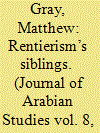

|
|
|
|
|
| Summary/Abstract |
his paper examines rentier state theory (RST), and specifically “rentierism” as a more refined and nuanced variant of RST, arguing that while rentierism provides considerable utility in explaining the state-society relationships of the contemporary Arab states of the Persian Gulf, it is insufficient as a stand-alone explanation, and needs to be considered as a political dynamic of the state-society relationship, rather than as a structural explanation for the state itself, as early RST more ambitiously sought to do. Rentierism therefore needs to be utilized in combination with two other explanatory frameworks, neopatrimonialism and state capitalism. In effect, these are rentierism’s theoretical “siblings”: they sharpen a rentier analysis by providing greater nuance about how elite networks, business-government relations, and personalized politics operate and interact in the allocative settings of the Gulf, as well as illustrating both the scope and the limits of rentierism as an explanatory framework.
|
|
|
|
|
|
|
|
|
|
|
|
|
|
|
|
| 14 |
ID:
124146
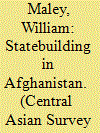

|
|
|
|
|
| Publication |
2013.
|
| Summary/Abstract |
The process of statebuilding in Afghanistan since 2001 has been complicated by a diverse set of problems, including the unintended consequences of early political decisions, the choice of institutional forms that have fostered dysfunctional policy-making, and the slide towards a neopatrimonial system combining bureaucracy with patronage. These problems have had a corrosive effect on the statebuilding enterprise, leaving an ambiguous legacy as Afghanistan proceeds towards one of the most challenging phases of its modern history.
|
|
|
|
|
|
|
|
|
|
|
|
|
|
|
|
|
|
|
|
|